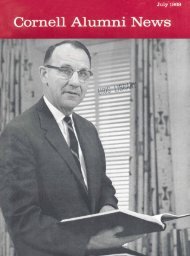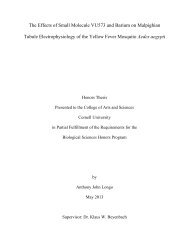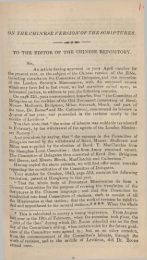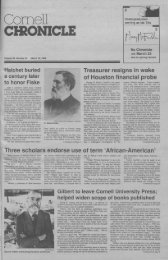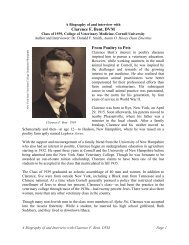1/1 - eCommons@Cornell - Cornell University
1/1 - eCommons@Cornell - Cornell University
1/1 - eCommons@Cornell - Cornell University
- No tags were found...
You also want an ePaper? Increase the reach of your titles
YUMPU automatically turns print PDFs into web optimized ePapers that Google loves.
CLASS NOTES<br />
ington, DC, which is managed by Jim Petzing.<br />
"Everything was perfect!" added Allan.<br />
A great letter from Gerald Gordon arrived<br />
a while ago. He was executive producer on<br />
a film entitled Scalpers, starring Andy Garcia<br />
and Rosanna Arquette, and after doing<br />
another film, expected to be working on a<br />
Broadway musical starring Robin Williams<br />
some time this year. "Hollywood has<br />
changed but it's still an exciting town."<br />
Marilyn "Micki" Levy Black retired<br />
("with mixed emotions") from her job as an<br />
employment counselor in Rochester. She's<br />
been working with single mothers on welfare<br />
to help them find employment. But having<br />
gone through two back surgeries, Micki<br />
finds that working full time leaves too little<br />
time and strength to enjoy life—so "I'm<br />
choosing fun! I feel guilty, but so what. As<br />
we approach our 40th Reunion, we're entitled<br />
to goof off a bit." Couldn't agree with<br />
you more! Robert Alstrin also recently retired,<br />
from the food marketing business, and<br />
now spends his time between Arizona and<br />
Wisconsin, traveling often to Australia where<br />
his son lives. "Golf and radio-control airplane<br />
flying (and crashing, sadly) are major hobbies."<br />
A couple of '55 scholars check in:<br />
Arthur Yelon chairs the engineering physics<br />
department at Ecole Polytechnic, the<br />
largest engineering school in Canada, and<br />
David West, a professor of biology at Virginia<br />
Polytechnic Inst. and State U., reports<br />
that he and wife Lindsey (Butte), '58-59<br />
Grad spent spring of 1993 on leave at the<br />
U. of Cambridge, where he was working on<br />
a biography of the 19th century naturalist<br />
Fritz Muller.<br />
Adrian "Andy" Phaneuf retired in<br />
1990, and is now enjoying the west coast of<br />
Florida, with a home in Homosassa. For<br />
three months each summer the Phaneufs<br />
head for the open road in their motor home.<br />
Pete Eschweiler retired from his position<br />
as commissioner of planning for Westchester<br />
County, NY and is now serving as planning<br />
advisor to the Hudson River Valley<br />
Greenway, a new agency promoting better<br />
planning and waterfront reclamation along<br />
the Hudson. Caryl Salomon Bernstein<br />
"retired" from Fannie Mae after 12 years<br />
as executive vice president, general counsel,<br />
and secretary, but joined the Washington,<br />
DC law firm of Shaw, Pittman, Potts &<br />
Trowbridge last fall as senior counsel. She<br />
is also on the board of directors of Georgetown<br />
U. Husband George continues in private<br />
law practice with his own DC firm.<br />
Other classmates still in harness: Rod<br />
Rougelot, who's CEO of Evans & Sutherland<br />
and lives with wife Carol (Schuette)<br />
in Salt Lake City; Sandy Montgomery Elder,<br />
librarian for the Moultenborough, NH<br />
schools; George Shear, an architect with<br />
Larsen Associates in NYC; and John Weiss,<br />
"plugging away" at his second career as<br />
chairman, Source Consumer Products in<br />
Westport, CT.<br />
After recovering from bypass surgery<br />
last year, Steve Price is back practicing<br />
psychiatry in Bethpage, Long Island, and is<br />
also teaching psychiatry residents at the<br />
North Shore campus of <strong>Cornell</strong> U. Medical<br />
College. Ronald Ganeles is completing his<br />
eighth year on the <strong>University</strong> Council, and<br />
was back to campus with wife Joyce (Ke-<br />
IMPRESSIONS OF<br />
A J E V ψ<br />
Elinore Schaffer '56 has lived in<br />
Paris for more than 30 years,<br />
where she ran her own business,<br />
teaching English as a second language.<br />
In the winter of1993-94,<br />
she traveled to Sarajevo "as a gesture<br />
of solidarity with the people<br />
there," according to her sister,<br />
Rita. Elinore Schaffer's account of<br />
war in Sarajevo provides a remarkable<br />
glimpse of life beneath<br />
the headlines.<br />
y stay in Sarajevo between<br />
Christmas and the<br />
New Year coincided with<br />
the holiday cease-fire,<br />
> still another truce which<br />
the Serbs did not respect. I went<br />
as an ordinary citizen, to show<br />
people there, by my American<br />
presence, that they had not been<br />
totally abandoned.<br />
To say that life is difficult in<br />
Sarajevo is an understatement. Everyone<br />
can recall a power outage.<br />
The elevator doesn't work, the TV<br />
goes off, food in the freezer begins<br />
to thaw. If the power goes off at<br />
night, you find a flashlight, rummage<br />
for a candle. After turning<br />
on a battery-powered radio to find<br />
out what happened, you eat a cold<br />
meal in a cold room.<br />
If for some reason your water<br />
has been turned off, the dishwasher,<br />
washing machine and toilet<br />
no longer function. You can't<br />
even wash your hands or make a<br />
cup of coffee. Multiply this by two<br />
years, close to 700 days.<br />
My companion and I stayed<br />
with Dr. Sahovic, who is Moslem.<br />
She is a surgeon in an eye clinic<br />
so deprived of equipment and<br />
medication that she can no longer<br />
do operations there. When on<br />
duty, the doctor walks the 25 minutes<br />
to the hospital. Otherwise she<br />
stays at home because she is afraid<br />
to go out. Rada, an elderly refugee<br />
from the countryside who<br />
lives with her, fetches water. A<br />
neighbor brings them a daily loaf<br />
of "humanitarian" bread—when it<br />
is available.<br />
The windows on each landing<br />
ELINORE SCHAFFER '56<br />
of her apartment building have been<br />
blown out. The apartment windows<br />
have been replaced by opaque plastic<br />
sheeting with UNHCR (United National<br />
High Commission for Refugees) written<br />
on the outside in large blue letters.<br />
Dr. Sahovic's spacious home, the<br />
modern appliances and magnificent Persian<br />
rugs, mark her as well-to-do. Now<br />
she saves the candle drippings to make<br />
new candles. Her monthly salary buys<br />
a box of matches.<br />
Sarajevo is blessed with hills and a<br />
river which flows through the heart of<br />
town. To go into the city center in broad<br />
daylight you must walk or run 100 yards<br />
in full view of snipers—first over the<br />
bridge where seven people were shot<br />
the week before, then through a square,<br />
hugging the buildings, until you reach<br />
the main cross street. Sarajevo is now<br />
a city of parks without trees (all burned<br />
for firewood) and empty squares in front<br />
of public buildings and churches. To linger<br />
is to risk your life.<br />
Humanitarian aid keeps people<br />
alive. Soup kitchens serve hot gruel to<br />
those who cannot fend for themselves.<br />
Young boys walk for miles with food<br />
for those who cannot get about. For others,<br />
rations are distributed every 15<br />
days: 2 pounds of flour, 1 pound of<br />
beans, 1 pound of rice, 700 grams of<br />
cooking oil (1 cup), 1 can of herring,<br />
1/3 cup of soap powder per adult.<br />
Some parts of the city have gas all<br />
the time, some have gas a few hours a<br />
day, others have none. The same is true<br />
for the telephone. Some phones work<br />
all the time, others rarely. Apart from<br />
a few generator-powered buildings,<br />
there is no electricity. Those without<br />
gas cook and try to keep warm by burning<br />
wood—in a stove, in a metal receptacle.<br />
To make their daily soup of rice<br />
and water some people are reduced to<br />
burning their furniture.<br />
Before the war, there was a rich<br />
and varied cultural life. The city boasted<br />
ten cinemas, two of which are still functioning<br />
on generators. There were theaters,<br />
a symphony orchestra, rock-music<br />
groups, art galleries, fine cuisine,<br />
coffee houses. Yet, cultural life stubbornly<br />
continues. I saw Paris, Texas<br />
while in Sarajevo, went to an art exhibit,<br />
a concert, to coffee houses, and





